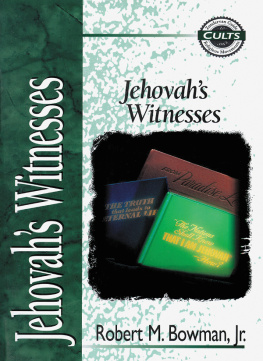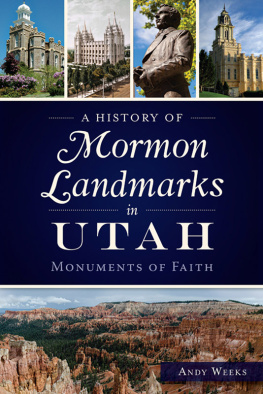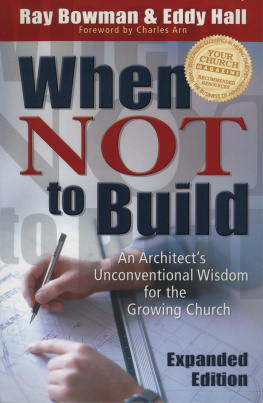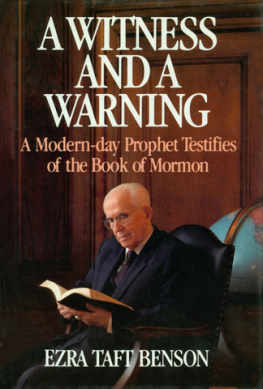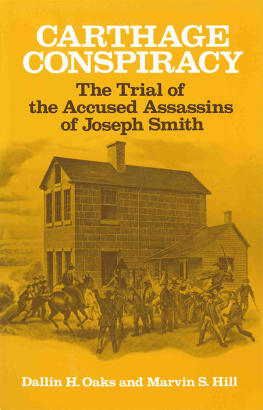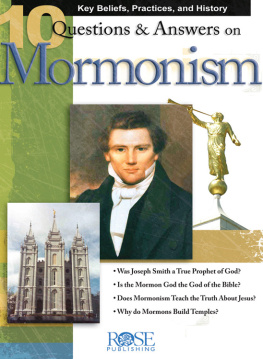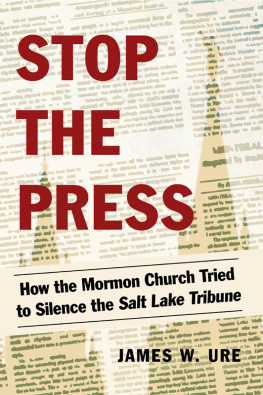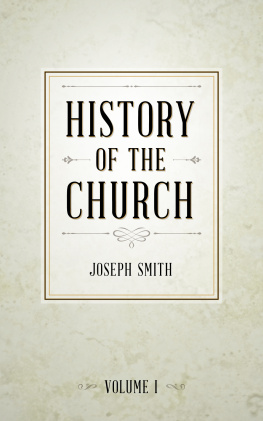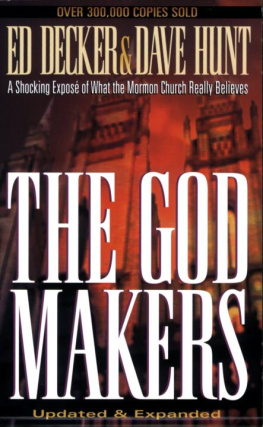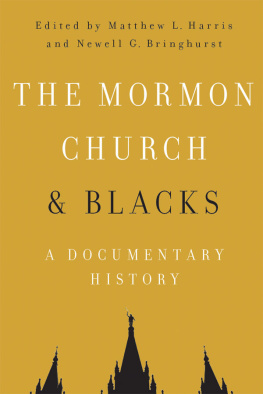For Further Reading
Abanes, Richard. One Nation Under Gods: A History of the Mormon Church . New York: Four Walls Eight Windows, 2002. By far the best critical history of the LDS movement.
Anderson, Ross. Understanding the Book of Mormon: A Quick Christian Guide to the Mormon Holy Book . Grand Rapids: Zondervan, 2009. An evangelical perspective.
Barlow, Philip L. Mormons and the Bible: The Place of the Latter-Day Saints in American Religion . Religion in America. Oxford: Oxford University Press, 1991. Mormon scholars historically illuminating study.
Beckwith, Francis J., Carl Mosser and Paul Owen, eds. The New Mormon Challenge: Responding to the Latest Defenses of a Fast Growing Movement . Grand Rapids: Zondervan, 2002. Evangelical scholars respond to Mormon theology and scripture.
Bowman, Robert M, Jr. Gospel Principles and the Bible . Grand Rapids: Institute for Religious Research, 2012. First comprehensive evangelical analysis and critique of Mormon doctrine, based on a chapter-by-chapter study of Gospel Principles .
Bushman, Richard Lyman. Mormonism: A Very Short Introduction . New York: Oxford University Press, 2008. Sophisticated introduction by a leading LDS historian.
Gospel Principles . Constantly reprinted primer in LDS doctrine, now in its fourteenth edition (2009), this is the closest thing to an official doctrinal manual for the LDS Church.
Larson, Charles M. By His Own Hand upon Papyrus: A New Look at the Joseph Smith Papyri . Rev. ed. Grand Rapids: Institute for Religious Research, 1985, 1992. Popular-level but detailed study of the Book of Abraham, explaining why it was not a translation from Egyptian papyri as Joseph Smith had claimed.
Ludlow, Daniel H., ed. Encyclopedia of Mormonism . 4 vols. New York: Macmillan, 1992. Standard reference produced by LDS scholars, now available free online.
McKeever, Bill, and Eric Johnson. Answering Mormons Questions: Ready Responses for Inquiring Latter-day Saints. Rev. ed . Grand Rapids: Kregel, 2012. One of the best evangelical responses.
Metcalfe, Brent Lee, ed. New Approaches to the Book of Mormon: Explorations in Critical Methodology . Salt Lake City: Signature Books, 1993. Dissident and former Mormons offer sophisticated studies questioning the antiquity of the Book of Mormon.
Palmer, Grant H. An Insiders View of Mormon Origins . Salt Lake City: Signature Books, 2002. Excellent critical study by former LDS Institute and seminary teacher.
Parry, Donald W., Daniel C. Peterson and John W. Welch, eds. Echoes and Evidences of the Book of Mormon . Provo, UT: FARMSBYU, 2002. Good example of academic Mormon apologetic arguments defending the Book of Mormon.
Quinn, D. Michael. Early Mormonism and the Magic World View . Rev. and enlarged ed. Salt Lake City: Signature Books, 1998. Former Mormon historians massive study of the magical and occult beliefs and practices popular in Joseph Smiths day that were part of the origins of Mormonism.
Southerton, Simon G. Losing a Lost Tribe: Native Americans, DNA, and the Mormon Church . Salt Lake City: Signature Books, 2004. Former Mormon academics account of the crisis for Mormon claims posed by DNA studies showing that Native Americans have no significant Israelite ancestry.
Websites
Church of Jesus Christ of Latter-day Saints . www.lds.org. Directed primarily to LDS.
FAIRFoundation for Apologetic Information & Research . www.fairlds.org. Perhaps the most popular LDS apologetics website.
Institute for Religious Research (Rob Bowman, Joel Groat). www.irr.org. Extensive resources on Mormonism. Features a program that facilitates mentoring of people coming out of the LDS Church.
Mormon Central (Michael Marquardt). www.xmission.com/ ~research/ central/ index.htm. Resources, of a higher caliber than is typical, on the LDS scriptures and related topics.
Mormon.org . www.mormon.org. Official site directed primarily to non-LDS.
Mormon Curtain . www.mormoncurtain.com. Over 3,000 articles; ex-LDS points of view.
Mormonism Research Ministry (Bill McKeever). www.mrm.org. A leading evangelical ministry focused exclusively on Mormonism.
Neal A. Maxwell Institute for Religious Scholarship . Includes what was formerly known as the Foundation for Ancient Research and Mormon Studies (FARMS). http:// maxwellinstitute.byu.edu. Academic, conservative Mormon apologetics.
Utah Lighthouse Ministry (Sandra Tanner). www.utlm.org. Website of a leading evangelical ministry famous for its groundbreaking discoveries and publications of previously unknown Mormon documents.
About the Author
Robert M. Bowman Jr. (M.A., Fuller Theological Seminary; Ph.D., South African Theological Seminary) is the director of research for the Institute for Religious Research. His books include Jehovah's Witnesses, The Word-Faith Controversy, Putting Jesus in His Place: The Case for the Deity of Christ (with J. Ed Komoszewski), and Faith Has Its Reasons (with Kenneth D. Boa).
Bowman taught apologetics and biblical studies at Luther Rice Seminary for five years.
Faith Has Its Reasons: Integrative Approaches to Defending the Christian Faith
Ever since the apostle Paul addressed the Stoic and Epicurean philosophers in Athens, relating the Christian worldview to a non-Christian world has been a challenge. And despite Peter's charge to be ready to make a defense to everyone who asks you to give an account for the hope that is in you (1 Peter 3:15), most Christian laypeople have left apologeticsthe defense of the faithto the ecclesiastical pros.
Faith Has Its Reasons is a study of four different models of how apologetics should be done, an assessment of their strengths and weaknesses, and a proposal for integrating the best insights of each. Kenneth Boa and Robert Bowman have assembled a wealth of information about what Christians believe and how to present that faith to an unbelieving world. Remarkable both in its depth of content and ease of accessibility, Faith Has Its Reasons gives Christian laypeople the tools to address such critical questions as:
- Why is belief in God rational despite the prevalence of evil in the world?
- What facts support the church's testimony that Jesus rose from the dead?
- Can we be certain Christianity is true?
- How can our faith in Christ be based on something more secure than our own understanding without descending into an irrational emotionalism?
What Mormons Believe
Robert M. Bowman Jr.

www.IVPress.com/books
Contents
Introduction
What About Mitt Romney?
Mitt Romneys run for the Republican nomination for U.S. president in 2012 has provoked great interest in the question of what Mormons believe.
Mitt Romneys great-great-grandfather was Parley Pratt, a Mormon apostle who had twelve wives. His great-grandparents were polygamous Mormons who moved to Mexico because of U.S. anti-polygamy laws. Miles Park Romney had five wivesincluding one taken in 1897, more than six years after the Manifesto supposedly announcing a ban
Romneys father, George Romney, was born in 1907 in Chihuahua, Mexico, to monogamous parents, and moved with them to the United States in 1912. George went on to become governor of Michigan (1963-1969) and the head of HUD under Richard Nixon (1969-1973). During his retirement years, George Romney held the offices of patriarch and regional representative of the Quorum of the Twelve Apostles in the LDS Church.
Mitt Romneys Mormonism is not his great-grandfathers Mormonism. In recent years, Mitt has occasionally expressed contempt for the practice of polygamy and pointed out that Mormons no longer practice it, but he has also joked that as a Mormon he believed that marriage should be Ironically, as his wife, Ann, pointed out on the presidential campaign trail in 2007, Mitt was one of the few Republican presidential candidates at the time who had had only one wifesince Rudy Giuliani had been married three times and John McCain, the eventual Republican nominee, had been married twice. By contrast, all of the major Republican candidates for the 2012 nomination have been married only once except for Newt Gingrich, who has been married three times.


